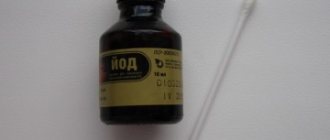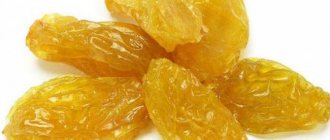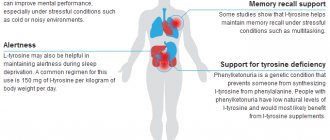Mechanism of action
Once ingested, L-Tyrosine enters the bloodstream and is then transported throughout the body. In the brain, it is converted into a molecule known as levodopa (L-dopa is a precursor to dopamine).
Dopamine is an important chemical synthesized from tyrosine that helps regulate mood, physical performance, and cognitive function. Dopamine is then converted into norepinephrine and adrenaline. Norepinephrine is needed to restore muscles and blood flow, and adrenaline is needed for concentration and a burst of energy.
L-Tyrosine plays an important role in stimulating the thyroid gland to produce hormones: T3 (triiodothyronine) and T4 (thyroxine). They control metabolism, regulate heart rate, body temperature, and water levels in the body. When the thyroid gland works correctly, the brain remains toned, the temperature is normal, and body weight is balanced.
The effect of taking it appears after 60 minutes and can last up to 4 hours.
What does the substance tyrosine combine with?
To complete the picture, it is necessary to say what the substance tyrosine is combined . Some sources contain information that when treating with monoamine oxidase inhibitors (a drug for depression), you need to give up foods containing the amino acid or stop taking tyrosine preparations . Otherwise, the pressure may rise sharply. On the contrary, the combination with vitamins C and B, niacin and chlorine is favorable. In addition, tyrosine combines well with methionine.
Doctors say that for certain diseases, foods rich in tyrosine should be avoided. First of all, we are talking about any tumors. Those who suffer from migraines should not overuse such dishes.
We looked at the action of the conditionally essential amino acid tyrosine . Now you know that this substance is an effective medicine for diseases of the thyroid gland and nervous system. It is also taken by athletes in the form of dietary supplements as a means of endurance . Despite the fact that an overdose of tyrosine is rare, it is better to consult a specialist using such drugs
Beneficial features
Improves mood
It increases dopamine levels. In the brain, dopamine functions as a neurotransmitter that facilitates daily activities, pleasure, memory and concentration. Normal levels of dopamine help a person feel more relaxed and alert, increasing mental focus. []
Increases energy
It helps increase energy levels and reduce memory problems caused by fatigue and hormonal (adrenal and thyroid) deficiency.
The adrenal glands convert tyrosine into adrenaline and norepinephrine, which stimulates the sympathetic nervous system. The thyroid gland also uses this amino acid to produce thyroxine, a hormone that controls the body's basic metabolism.
Through these two actions, L-Tyrosine influences important metabolic processes that control energy balance, storage and expenditure of micronutrients. It promotes gluconeogenesis and lipolysis, which help lower cholesterol and increase fat loss. []
Increases concentration
Everyday brain activity and stress deplete norepinephrine in the brain, causing memory, attention, and intelligence to suffer.
L-Tyrosine counteracts working memory biases and processing deficits caused by environmental influences and extreme cognitive demands. Studies have shown that participants taking L-Tyrosine perform better on complex tasks that require increased focus. []
Tyrosine for ADHD
ADHD is a disorder of attention deficit hyperactivity, the main cause of which is a lack of dopamine. Most prescription medications for ADHD stimulate the release of dopamine and norepinephrine.
Since L-Tyrosine is a precursor of dopamine and promotes the production of adrenaline and norepinephrine, its addition to treatment can be considered quite effective. Research shows that more than half of subjects experience a decrease in negative symptoms. []
Slows down hair graying and gives a healthy tan
Gray hair is an aging-related feature of the body that depends on the presence or absence of a pigment called melanin. Melanin is produced in melanocytes, special cells in the skin. The availability of this pigment depends on the natural color of the skin and hair. L-Tyrosine is converted to melanin through a strictly controlled process in melanocytes. Tyrosine deficiency can lead to premature or accelerated graying of hair and skin pigmentation.
Biosynthesis
In the process of tyrosine biosynthesis, intermediate compounds are shikimate, chorismate, and prephenate. From the central metabolites, tyrosine is synthesized in nature by microorganisms, fungi and plants. Animals do not synthesize tyrosine de novo, but are able to hydroxylate the essential amino acid phenylalanine into tyrosine. The biosynthesis of tyrosine is discussed in more detail in the article, the shikimate pathway.
Tyrosine is classified as non-essential
for most animals and humans, amino acids, since in the body this amino acid is formed from another (essential) amino acid - phenylalanine.
Side effects
L-Tyrosine increases the production of dopamine, melatonin, adrenaline, norepinephrine and beta-endorphin. Such stimulation of the central nervous system can lead to undesirable effects. Another reason may be too frequent use and high dosage.
Side effects from taking L-Tyrosine include:
- Heart rhythm disturbance.
- Fluctuations in blood pressure.
- Chest pain.
- Excitement and fear.
- Loss of appetite and weight.
- Gastrointestinal disorders: abdominal pain, heartburn, nausea and diarrhea (diarrhea).
- Labored breathing.
- Dizziness, headaches.
- Drowsiness, fatigue.
- Insomnia.
- Irritability, nervousness.
Top 3 producers of L-tyrosine
- L-tyrosine from MYPROTEIN . Contains 0.5 grams per serving (2.5 scoops). The amino acid is packaged in 250 grams or 500 grams in sealed packaging with a reliable zip-lock that guarantees the tightness of the container.
You can order on the official website.
- L-tyrosine from Solgar , 500 mg capsules. This convenient capsule form contains 500 mg per capsule. It is recommended to take 1-2 capsules per day. The container contains 100 tablets.
- Tyrosine from Scitec Nutrition. The container contains 100 capsules. One capsule contains 500 mg of tyrosine, gelatin, magnesium stearate. The daily dose is 2-4 capsules.
Contraindications
Phenylketonuria is a rare inherited disease characterized by an inability to metabolize phenylalanine, resulting in its toxic accumulation. Phenylalanine is an amino acid that is responsible for the production of tyrosine.
Pregnant and lactating women (without medical consent).
Hyperthyroidism is a disorder of the normal functioning of the thyroid gland, characterized by excessive production and accumulation of two hormones: T3 (triiodothyronine) and T4 (thyroxine), which are responsible for metabolism and other body functions.
Tyrosine preparations
Speaking about the use of this substance in medicine and pharmaceuticals , it must be said that today many medicines and food supplements containing tyrosine are produced. The amino acid is produced in tablets, capsules and powder form. With their help you can overcome stress, chronic fatigue syndrome, depression, allergies, headaches and thyroid diseases. Tyrosine preparations also prescribed for hypotension, vegetative-vascular dystonia, obesity, hypothyroidism, Parkinson's disease, Vitiligo, and hyperactivity in children. They also help speed up a slow metabolism and are useful in the treatment of alcoholism and drug addiction.
Scientists have noticed that thanks to this amino acid, concentration and focus . Therefore, this substance will help those who suffer from insomnia to be active during the day. Some researchers have suggested that tyrosine may be useful in Alzheimer's disease, impotence, heart disease and schizophrenia, but so far this effect of tyrosine preparations remains unproven.
In recent years, this substance has attracted increasing attention from scientists, due to the desire to reduce the number of patients with phenylketonuria (oligophrenia). Studies have also been conducted in which increased levels of tyrosine in the blood and urine were recorded in patients with rheumatism, rheumatoid arthritis, and tonsillitis. Doctors believe that this pattern will help identify the rheumatic process at an early stage. Another experiment helped discover that this substance helps to perform complex intellectual work in conditions that are uncomfortable for humans (+4 º C).
Instructions for use
The standard dosage is 500-1000 mg/day, divided into 2-3 times. For athletes - from 500 to 2000 mg 30 minutes before training.
It is best to take L-Tyrosine on an empty stomach 30 minutes before meals. This allows it to better penetrate the bloodstream and produce the necessary neurotransmitters.
Where is tyrosine found?:
- Protein : beef, pork, cheese, chicken, turkey, eggs, fish.
- Vegetables : artichoke, avocado, beets, black beans, cauliflower, spinach.
- Fruits : apples, bananas, blueberries, papaya, prunes, strawberries, watermelon.
- Others : chocolate, coffee, ginkgo biloba, ginseng, green tea, nuts, spirulina (seaweed), turmeric (spice).
Tyrosine in food
L-tyrosine is found in protein foods such as meat and eggs, as well as some plant foods in smaller quantities. Some of the best food sources of tyrosine include:
- Organic dairy products such as raw milk, yogurt or kefir
- Pasture-raised meat and poultry
- Caught fish
- Eggs
- Nuts and seeds
- Beans and legumes
- Whole grains such as quinoa, oats, etc.
- Protein powders
In order for tyrosine to be converted into neurotransmitters, you also need to consume adequate amounts of several other nutrients, including vitamin B6, folate, and copper. This means you should also regularly include foods high in these nutrients in your diet, such as eggs, beef, leafy greens, asparagus, oranges, legumes, almonds and other nuts and seeds such as sunflower and chia seeds, whole grains , such as quinoa and wheat germ, avocado and broccoli.
Unlike the amino acid tryptophan, which can have the same stimulating effects as tyrosine, tyrosine levels increase when you eat protein foods or take tyrosine supplements. Tryptophan and tyrosine actually compete with each other in the body, meaning that when the level of one increases, the level of the other usually decreases.
Drug interactions and dosage regimen
The dietary supplement L-tyrosine should be taken between meals (on an empty stomach) in combination with vitamins B1 (thiamine), B2, B3 (niacin, nicotinic acid), B6 (pyridoxine), B9 (folic acid), C (ascorbic acid). You can dilute tyrosine with fresh orange juice (freshly squeezed juice), which contains many vitamins, primarily C.
When treating depression, to overcome stress, and relieve nervous tension, it is recommended to take tyrosine as part of herbal preparations with St. John's wort, valerian, lemon balm, chamomile, and mint.
For insomnia, it is recommended to take the drug at a dose of 1.5 g in the morning.
For athletes, the dosage should be increased to 3 g per day, usually this dose is divided into 2 to 1.5 g in the morning and afternoon.
The duration of taking the L-tyrosine dietary supplement is 1.5 - 3 months, after which you can take a break of 0.5 - 1 month and, if necessary, continue the course.











